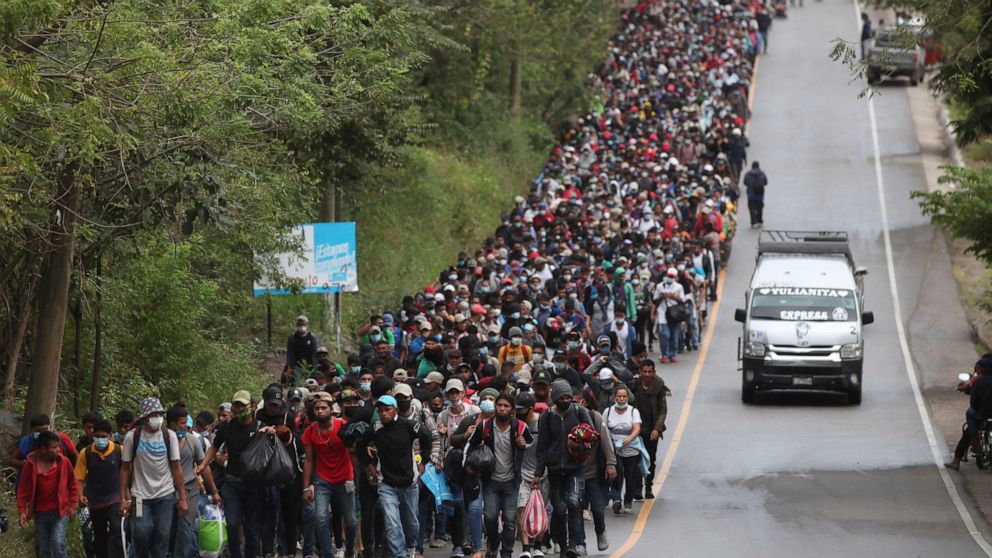Guatemalan soldiers blocked part of a caravan of up to 9,000 Honduran migrants not far from where they entered the country in an attempt to reach the border with the United States
GUATEMALA CITY – Guatemalan soldiers blocked part of a caravan of up to 9,000 Honduran migrants on Saturday at a point not far from where they entered the country to reach the border with the United States.
The soldiers, many wearing helmets and wielding shields and poles, formed lines on a highway in Chiquimula, near the border with Honduras, to block the procession of migrants.
The Guatemalan immigration agency distributed a video showing a few hundred men fighting with soldiers, pushing and running along their lines, even though troops were holding hundreds of others.
“The Guatemalan government regrets this violation of national sovereignty and calls on Central American governments to take measures to avoid putting their inhabitants at risk in the midst of a health emergency due to the pandemic,” continues Giammattei’s statement.
Guatemala has set up almost a dozen checkpoints on highways and can begin transporting more migrants back to Honduras, as it has done before, arguing that they pose a risk to themselves and others by traveling during the coronavirus pandemic.
Governments across the region have made it clear that they will not let the caravan pass.
Mexico continued to train thousands of National Guard members and immigration officers on its southern border, in a show of strength designed to discourage the caravan from crossing into Mexico.
On Friday night, two groups of more than 3,000 Honduran migrants each made their way to Guatemala without registering, part of a larger caravan of migrants that had left the Honduran city of San Pedro Sula before dawn. A third group entered Guatemala on Saturday.
Honduran migrants are trying to cross Guatemala to reach Mexico, driven by rising poverty and the hope of a warm welcome if they manage to reach the border with the United States. However, several previous attempts to form caravans have been stopped by Mexico, Guatemala and Honduras.
On Friday, the migrants left around 4 am in San Pedro Sula, young people and entire families carrying sleeping children. Some hitchhiked quickly while others walked the highway escorted by the police.
Mainor Garcia, a 19-year-old worker from San Pedro Sula, was carrying a purple backpack while walking down the highway early Friday. He said he was afraid of the trip, but willing to take the risk. “(Hurricanes) Eta and Iota destroyed all of our homes,” he said.
“There is no choice” but to leave, said Oscar Zaldivar, 25, a driver from Cofradia. “You have to leave here, this country, because we are going to die here.”
The International Committee of the Red Cross said in a statement on Friday that “The combination of COVID-19, social exclusion, violence and climate-related disasters that occur at the same time with a magnitude rarely seen in Central America raises new humanitarian challenges. . ”
Migrants are leaving with little certainty about how far they will go. Regional governments have recently seemed more united than ever in preventing their progress.
Francisco Garduño Yáñez, head of the National Immigration Institute of Mexico, said in a statement on Friday that his country must “guarantee our national territory” and called for “an orderly, safe and legal migration, with respect for human rights and with humanitarian policies ”.
On Wednesday, the 11-nation Regional Conference on Migration “expressed concern about the exposure of irregular migrants to situations of high risk to their health and their lives, especially during the health emergency”.
On Thursday, Mexican officials said they discussed migration with the choice of US President-elect Joe Biden for national security adviser Jake Sullivan and discussed a possible development program for northern Central and southern America. Mexico “in response to the economic crisis caused by the pandemic and the recent hurricanes in the region”.
——
Escalon denounced in San Pedro Sula, Honduras.
